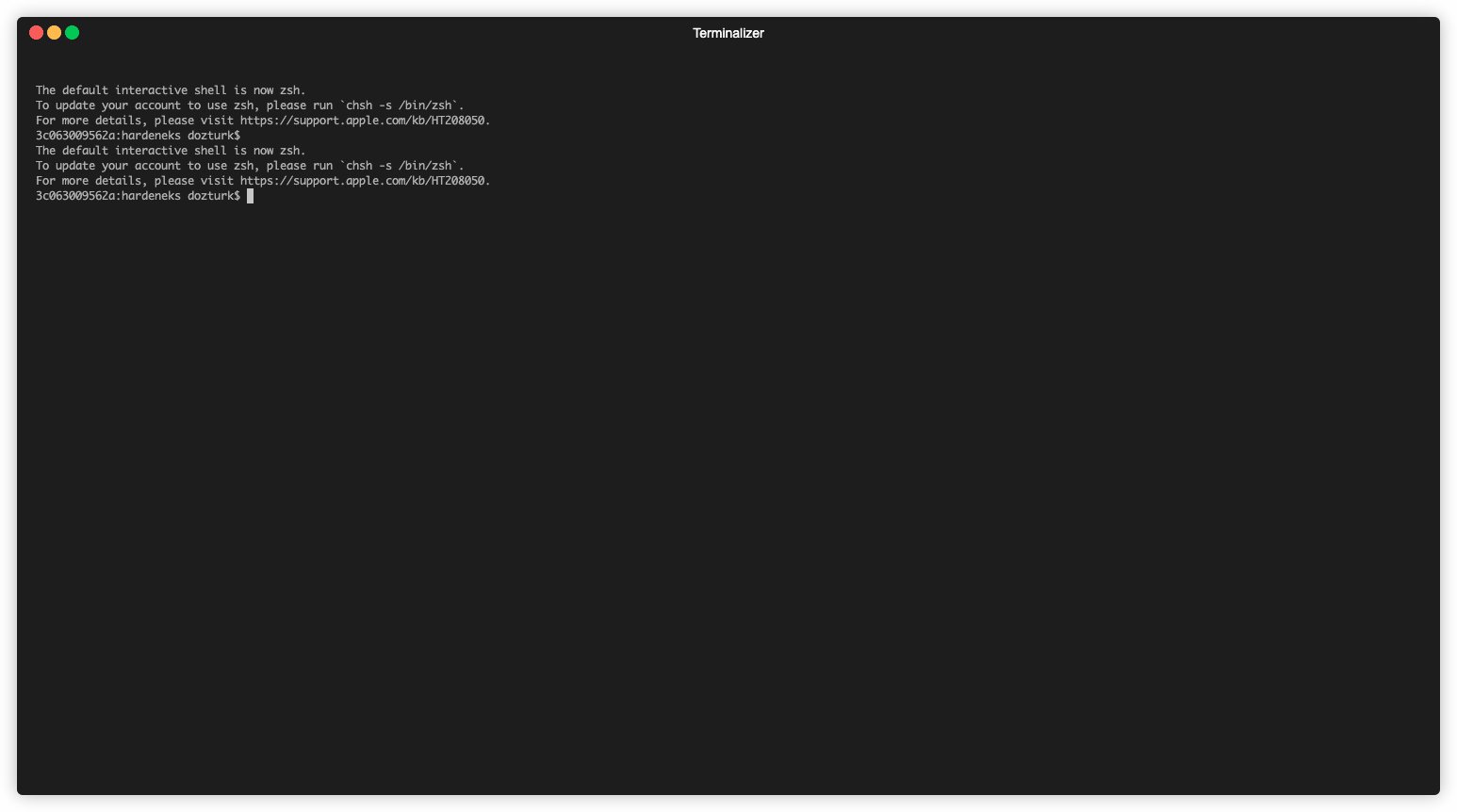https://github.com/aws-samples/hardeneks
Runs checks to see if an EKS cluster follows EKS Best Practices.
https://github.com/aws-samples/hardeneks
aws best-practices eks k8s
Last synced: 4 months ago
JSON representation
Runs checks to see if an EKS cluster follows EKS Best Practices.
- Host: GitHub
- URL: https://github.com/aws-samples/hardeneks
- Owner: aws-samples
- License: mit-0
- Created: 2022-12-09T21:17:30.000Z (about 3 years ago)
- Default Branch: main
- Last Pushed: 2025-01-31T17:49:51.000Z (about 1 year ago)
- Last Synced: 2025-04-05T05:35:39.926Z (11 months ago)
- Topics: aws, best-practices, eks, k8s
- Language: Python
- Homepage: https://aws-samples.github.io/hardeneks/
- Size: 4.79 MB
- Stars: 904
- Watchers: 9
- Forks: 93
- Open Issues: 11
-
Metadata Files:
- Readme: README.md
- Changelog: CHANGELOG.md
- Contributing: CONTRIBUTING.md
- License: LICENSE
- Code of conduct: CODE_OF_CONDUCT.md
Awesome Lists containing this project
- awesome-platform-engineering - hardeneks - Runs checks to see if an EKS cluster follows EKS Best Practices (Kubernetes / Kubernetes security posture management)
README
# Hardeneks
[](https://badge.fury.io/py/hardeneks)
[](https://pypi.python.org/pypi/hardeneks/)
[](https://github.com/aws-samples/hardeneks/actions/workflows/ci.yaml)
[](https://pepy.tech/project/hardeneks)
Runs checks to see if an EKS cluster follows [EKS Best Practices](https://aws.github.io/aws-eks-best-practices/).
**Quick Start**:
```
python3 -m venv /tmp/.venv
source /tmp/.venv/bin/activate
pip install hardeneks
hardeneks
```

**Usage**:
```console
hardeneks [OPTIONS]
```
**Options**:
* `--region TEXT`: AWS region of the cluster. Ex: us-east-1
* `--context TEXT`: K8s context
* `--cluster TEXT`: EKS Cluster name
* `--namespace TEXT`: Namespace to be checked (default is all namespaces)
* `--config TEXT`: Path to a hardeneks config file
* `--export-txt TEXT`: Export the report in txt format
* `--export-csv TEXT`: Export the report in csv format
* `--export-html TEXT`: Export the report in html format
* `--export-json TEXT`: Export the report in json format
* `--export-security-hub`: Export failed checks to AWS Security Hub
* `--insecure-skip-tls-verify`: Skip TLS verification
* `--width`: Width of the output (defaults to terminal size)
* `--height`: Height of the output (defaults to terminal size)
* `--help`: Show this message and exit.
- K8S_CONTEXT
You can get the contexts by running:
```
kubectl config get-contexts
```
or get the current context by running:
```
kubectl config current-context
```
- CLUSTER_NAME
You can get the cluster names by running:
```
aws eks list-clusters --region us-east-1
```
**Configuration File**:
Default behavior is to run all the checks. If you want to provide your own config file to specify list of rules to run, you can use the --config flag.You can also add namespaces to be skipped.
Following is a sample config file:
```yaml
---
ignore-namespaces:
- kube-node-lease
- kube-public
- kube-system
- kube-apiserver
- karpenter
- kubecost
- external-dns
- argocd
- aws-for-fluent-bit
- amazon-cloudwatch
- vpa
rules:
cluster_wide:
security:
iam:
- disable_anonymous_access_for_cluster_roles
- check_endpoint_public_access
- check_aws_node_daemonset_service_account
- check_access_to_instance_profile
- restrict_wildcard_for_cluster_roles
multi_tenancy:
- ensure_namespace_quotas_exist
detective_controls:
- check_logs_are_enabled
network_security:
- check_vpc_flow_logs
- check_awspca_exists
- check_default_deny_policy_exists
encryption_secrets:
- use_encryption_with_ebs
- use_encryption_with_efs
- use_efs_access_points
infrastructure_security:
- deploy_workers_onto_private_subnets
- make_sure_inspector_is_enabled
pod_security:
- ensure_namespace_psa_exist
image_security:
- use_immutable_tags_with_ecr
reliability:
applications:
- check_metrics_server_is_running
- check_vertical_pod_autoscaler_exists
namespace_based:
security:
iam:
- disable_anonymous_access_for_roles
- restrict_wildcard_for_roles
- disable_service_account_token_mounts
- disable_run_as_root_user
- use_dedicated_service_accounts_for_each_deployment
- use_dedicated_service_accounts_for_each_stateful_set
- use_dedicated_service_accounts_for_each_daemon_set
pod_security:
- disallow_container_socket_mount
- disallow_host_path_or_make_it_read_only
- set_requests_limits_for_containers
- disallow_privilege_escalation
- check_read_only_root_file_system
network_security:
- use_encryption_with_aws_load_balancers
encryption_secrets:
- disallow_secrets_from_env_vars
runtime_security:
- disallow_linux_capabilities
reliability:
applications:
- check_horizontal_pod_autoscaling_exists
- schedule_replicas_across_nodes
- run_multiple_replicas
- avoid_running_singleton_pods
```
## RBAC
In order to run hardeneks we need to have some permissions both on AWS side and k8s side.
### Minimal IAM role policy
```json
{
"Version": "2012-10-17",
"Statement": [
{
"Effect": "Allow",
"Action": "eks:ListClusters",
"Resource": "*"
},
{
"Effect": "Allow",
"Action": "eks:DescribeCluster",
"Resource": "*"
},
{
"Effect": "Allow",
"Action": "ecr:DescribeRepositories",
"Resource": "*"
},
{
"Effect": "Allow",
"Action": "inspector2:BatchGetAccountStatus",
"Resource": "*"
},
{
"Effect": "Allow",
"Action": "ec2:DescribeFlowLogs",
"Resource": "*"
},
{
"Effect": "Allow",
"Action": "ec2:DescribeInstances",
"Resource": "*"
}
]
}
```
### Minimal ClusterRole
```yaml
kind: ClusterRole
apiVersion: rbac.authorization.k8s.io/v1
metadata:
name: hardeneks-runner
rules:
- apiGroups: [""]
resources: ["namespaces", "resourcequotas", "persistentvolumes", "pods", "services", "nodes"]
verbs: ["list"]
- apiGroups: ["rbac.authorization.k8s.io"]
resources: ["clusterroles", "clusterrolebindings", "roles", "rolebindings"]
verbs: ["list"]
- apiGroups: ["networking.k8s.io"]
resources: ["networkpolicies"]
verbs: ["list"]
- apiGroups: ["storage.k8s.io"]
resources: ["storageclasses"]
verbs: ["list"]
- apiGroups: ["apps"]
resources: ["deployments", "daemonsets", "statefulsets"]
verbs: ["list", "get"]
- apiGroups: ["autoscaling"]
resources: ["horizontalpodautoscalers"]
verbs: ["list"]
```
## For Developers
**Prerequisites**:
* This cli uses poetry. Follow instructions that are outlined [here](https://python-poetry.org/docs/) to install poetry.
**Installation**:
```console
git clone git@github.com:aws-samples/hardeneks.git
cd hardeneks
poetry install
```
**Running Tests**:
```console
poetry shell
pytest --cov=hardeneks tests/ --cov-report term-missing
```